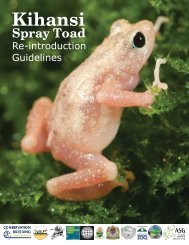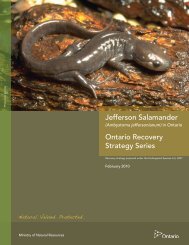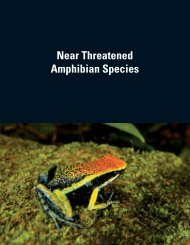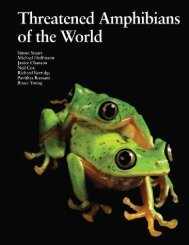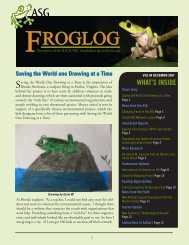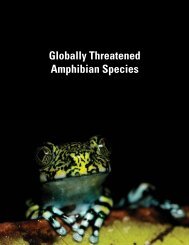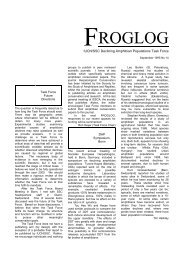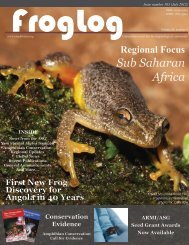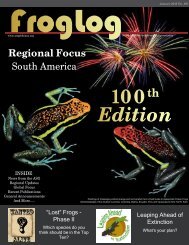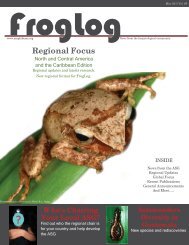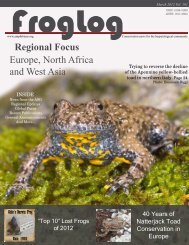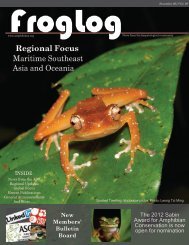download the PDF here - Amphibian Specialist Group
download the PDF here - Amphibian Specialist Group
download the PDF here - Amphibian Specialist Group
Create successful ePaper yourself
Turn your PDF publications into a flip-book with our unique Google optimized e-Paper software.
<strong>Amphibian</strong> Conservation Workshop in India<br />
By Don Church<br />
On August 8, 2011, a workshop<br />
entitled ‘Advancing frontiers of<br />
amphibian conservation’ was held at<br />
<strong>the</strong> Kerala Forest Department Auditorium<br />
in Thiruvananthapuram, India. The Chief<br />
Minister of Kerala, Oommen Chandy,<br />
inaugurated <strong>the</strong> workshop that was jointly<br />
organized by <strong>the</strong> University of Delhi and <strong>the</strong><br />
Kerala State Forest Department.<br />
Minister for Forests, K.B Ganesh Kumar,<br />
presided over <strong>the</strong> function. Prof Dinesh<br />
Singh, Vice Chancellor of <strong>the</strong> University<br />
of Delhi, S D Biju, faculty of <strong>the</strong> Department Environmental<br />
Biology of University of Delhi and Forest Chief Conservator T.M<br />
Manoharan were also present, in addition to over 100 Forest<br />
Department officials from <strong>the</strong> states of Kerala, Tamil Nadu,<br />
Karnataka, Maharashtra and Gujarat. In addition, <strong>the</strong> meeting<br />
was attended by several journalists and resulted in over 30<br />
newspaper articles and a forthcoming CNN-IBN special report<br />
that will address amphibian conservation in India.<br />
Herpetologists presented <strong>the</strong>ir most current analyses of species<br />
richness, diversity and conservation priorities within specific<br />
areas of <strong>the</strong> Western Ghats. Forest Department officials delivered<br />
presentations that overviewed how <strong>the</strong>ir current management<br />
Chief Minister Oommen Chandy inaugurates <strong>the</strong> workshop, ‘Advancing frontiers of amphibian conservation’.<br />
practices address amphibian conservation needs. Chief Minister<br />
Chandy announced, “Government will take all necessary steps to<br />
protect <strong>the</strong> amphibian community”. Following <strong>the</strong> workshop he<br />
has begun to schedule meetings with biologists to discuss next<br />
steps toward advancing conservation actions for amphibians.<br />
An interactive closing session was led by CNN-IBN journalist,<br />
Bahar Dutt, to address how media can better report on <strong>the</strong><br />
situation amphibians are in and what needs to be done to reverse<br />
<strong>the</strong>ir declines.<br />
Funding for <strong>the</strong> workshop was provided by <strong>the</strong> US Fish and<br />
Wildlife Service, Global Wildlife Conservation, Kerala State Forest<br />
Department, and <strong>the</strong> University of Delhi.<br />
More Frog Bounties<br />
from India’s Peninsular<br />
Mountains<br />
By Robin Abraham<br />
India’s Western Ghats mountain range has been in <strong>the</strong> news,<br />
on and off in <strong>the</strong> recent past for a wide array of biological<br />
discoveries made <strong>here</strong>. This is thanks to an increasing spurt<br />
of interest by various experts, which has only added stronger<br />
evidence to <strong>the</strong> significance of <strong>the</strong>se ancient mountains as a very<br />
important biodiversity hotspot 1 . <strong>Amphibian</strong>s are one group that<br />
has been at <strong>the</strong> forefront of <strong>the</strong>se discoveries <strong>here</strong>. Over a period<br />
of ten years from <strong>the</strong> year 2000 to 2010, almost 40 new species of<br />
frogs have been described under various genera and even a new<br />
family, all of which are restricted to <strong>the</strong> Western Ghats. In fact,<br />
more than 85% of frog species found in this region are endemic.<br />
But, <strong>the</strong> discovery of an additional ten species this year takes <strong>the</strong><br />
total tally of documented frog species in <strong>the</strong> Western Ghats to<br />
145. A team led by Dr. Anil Zachariah announced <strong>the</strong>se novelties<br />
in August 2011 2,3 . Dr. Zachariah was fundamental in supporting<br />
<strong>the</strong> expeditions that lasted close to five years, mainly sustained by<br />
his veterinary practice in <strong>the</strong> Department of Animal Husbandry<br />
The Western Ghats hold many microhabitats that supports an exceptional diversity of<br />
amphibians. Photo: Robin Abraham<br />
in Wayanad, Kerala. The o<strong>the</strong>r team members constituted of Prof.<br />
E. Kunhikrishnan of <strong>the</strong> University of Kerala, C. Radhakrishnan,<br />
K.P. Dinesh and M. Jafer Palot of <strong>the</strong> Zoological Survey of India,<br />
voluntary researchers S. Kalesh and C.K. Vishnudas along with<br />
two keen, enthusiastic young naturalists, Sandeep Das and David<br />
Raju.<br />
FrogLog Vol. 98 | September 2011 | 19



